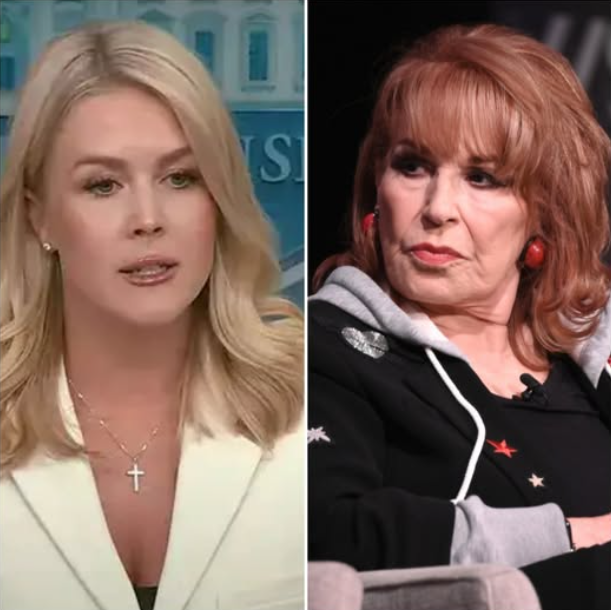In a surprising turn of events, a political debate on The View became a profound moment of introspection, vulnerability, and connection when Caroline Levitt, a rising political figure, and Joy Behar, the long-time host known for her sharp wit, engaged in a candid exchange about faith, purpose, and personal growth. What started as an uncomfortable confrontation soon evolved into an unexpected moment of emotional depth that would resonate far beyond the typical daytime television debate.
Caroline Levitt, a 26-year-old spokesperson and conservative voice, had been invited to discuss her political views. However, the conversation quickly shifted when Behar, with her trademark skepticism, challenged Levitt on her recently vocalized faith. “You’ve been talking about faith a lot on social media,” Behar began, her tone dripping with mockery. “Isn’t that a bit strange for someone so entrenched in modern politics? Are you just trying to cover all your bases?”
The audience responded with nervous laughter, sensing the tension as Levitt, initially caught off guard, steadied herself for what was clearly going to be a challenging conversation. For Behar, this was an opportunity to question the authenticity of Levitt’s newly found spiritual expression, a move that seemed calculated to stir up controversy.
Levitt, however, did not falter. Calmly and with poise, she countered, “What makes you think politics and faith are incompatible?”
Behar, ever the provocateur, continued pressing. “You’ve been working in political strategy, crafting campaigns, and now suddenly you’re posting about God. Seems convenient, doesn’t it?”
Levitt responded thoughtfully, sharing how her early career was focused solely on political messaging. “Five years ago, I would have agreed with you,” she admitted. “I was all about strategy and believed that faith had no place in politics. But that changed.”
The mood in the studio shifted as Levitt opened up about a life-altering experience in 2021, when professional setbacks made her question her path. “I was questioning everything—the purpose of my work, my role in public service,” she explained. The audience fell silent as they recognized a rare moment of vulnerability from a public figure usually defined by her political acumen.
Behar, not yet convinced, pressed further. “But a career crisis doesn’t usually lead to a spiritual awakening.”
Levitt calmly continued, revealing the deeper, more personal journey she had undergone, including grappling with existential questions and loss. “After my friend died in a car accident at 16, I shut down emotionally. I told myself it was just a tragedy, something to be managed. But that approach never allowed me to truly deal with the deeper questions that arose.”
The room grew quiet as Levitt shared her experience of feeling her deceased friend’s presence during a dark period in her early 20s, an encounter that shattered her materialistic worldview. “It was a transformative moment,” Levitt said, “one that made me question what lies beyond our physical existence.”
The unexpected turn of the conversation left the hosts and audience in stunned silence, with a noticeable shift in the studio’s atmosphere. Even Behar, who had started the conversation with mockery, seemed genuinely moved by Levitt’s emotional openness.
Levitt, now resolute in her beliefs, explained that her faith wasn’t just a political strategy. “It’s the result of a long process of questioning, searching for meaning, and reconciling my professional work with a deeper sense of purpose.”
The conversation, once tense and confrontational, evolved into a dialogue about shared human experiences—loss, faith, and the search for meaning. Behar, visibly softened by Levitt’s honesty, expressed sympathy for her pain and acknowledged the conversation had taken an unexpected but meaningful turn.
What followed was an unprecedented moment on live television. Levitt, with remarkable grace, turned the conversation back on Behar, asking about her own spiritual journey. Behar, caught off guard but intrigued, began to share her own complicated relationship with religion. The two women, from vastly different political worlds, found themselves engaging in an open, vulnerable dialogue about faith and doubt—something rarely seen on daytime TV.
As the segment ended, the hosts and the audience were visibly moved, with tears and applause marking the emotional shift in the room. Sunny Hostin, wiping away tears, summed up the moment: “This is what we need more of—a conversation that begins with conflict but ends with understanding.”
Within hours, the clip went viral, sparking a nationwide conversation. The hashtag #LevittBeharMoment trended as viewers from all political backgrounds celebrated the rare and powerful connection between two women who, despite their differences, found common ground through shared vulnerability.
Media outlets, commentators, and religious leaders alike praised the exchange for demonstrating the power of human connection in a time of division. “This moment showed that beneath the surface, we all have shared experiences of questioning and seeking meaning,” one journalist noted.
For Levitt and Behar, the impact of this exchange was profound, reminding both of them—and millions of viewers—of the transformative potential of honest, open dialogue in an age of polarization.
What began as a mockery-laden question ended with a breakthrough in understanding, not just for Levitt and Behar, but for all those who witnessed it. It was a moment that demonstrated how even the most contentious conversations can evolve into meaningful, transformative exchanges when people are willing to listen and engage authentically.
As one commentator put it, “In an era where we are encouraged to amplify conflict, this exchange was a testament to what can happen when we lean into vulnerability and share our humanity, even with those we disagree with.”










